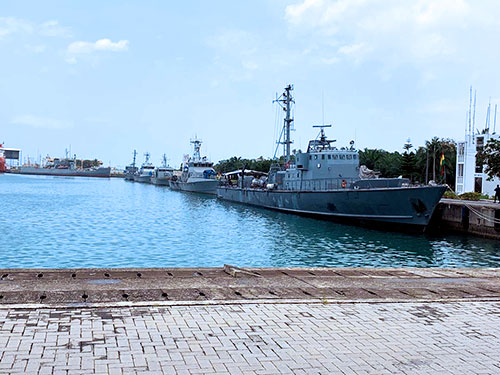Denmark partners KAIPTC for International conference on Maritime Security.
Accra 6thFebruary, 2020 –Danish Ambassador to Ghana, Her Excellency Tove Degnbol is warning of a looming withdrawal of European Shipping lines to countries in West Africa due to increasing activities of crime in the maritime space. The Ambassador said, “the piracy problem represents a serious threat to the economies of the countries along the Gulf of Guinea. It affects international trade, conditions for fisheries sector, the offshore oil sector and place the lives of international seafarers at risk.” H.E. Tove Dengnbol was speaking at the opening ceremony of a two-day international cooperation on maritime domain awareness seminar at the Kofi Annan International Peacekeeping Training Centre (KAIPTC). According to her, “we are seeing a trend with increasing and more violent assaults, more kidnappings, and unfortunately also an expanding geographical area of attacks.”
The Ambassador hinted that Danish and European shipping lines have been seen withdrawing their assets from some parts of West Africa; warning of negative impacts on the economies of all countries along the coast of the Gulf of Guinea and landlocked countries. She is called for close collaborations among countries and agencies in the maritime domain to address the problem.
The Chief of Naval Staff, Rear Admiral, Seth Amoama on his part, also called for deeper cooperation and collaboration from relevant partners of countries along the Gulf of Guinea. “The International Maritime Bureau report of 2019, cites states in the Gulf of Guinea maritime regions, as accounting for all six hijackings worldwide, 13 out of the 18 ships were fired upon, 130 out of the 141 hostages taken globally, and 28 out of 83 seafarers kidnapped for ransom in the first quarter of 2019 alone,” Rear Admiral Seth Amoama revealed.
The Chief of Naval Staff observed that, naval forces in the Gulf of Guinea face threats in carrying out their duties of policing the waters.
Commandant of KAIPTC, Major General Francis Ofori stressed on the need for the effective Implementation of the Yaoundé Protocol by all actors in the maritime space. He said, “Maritime threats are a common phenomenon especially in the Gulf of Guinea. Reports from the International Maritime Organization (IMO) and a plethora of similar International and Regional Agencies often identify issues such as attacks on sea-based transportation equipment, networks and cargoes.” He added that the Maritime Domain is one big space that enjoys the confluence of transnational economic resources, state authority, commerce and crime. He noted that the KAIPTC and its partners are optimistic that the full implementation of this project will enhance comprehensive national and regional response to the threats to maritime safety and security particularly in the Gulf of Guinea.
Commandant of the Royal Danish Defense College, Rear Admiral Herick Ryberg said, “the primary reason for the involvement of the Royal Danish Defense College and the Danish Stabilization Programme in the project, is basically to provide the conditions for generation of new ideas on reducing maritime insecurity”. The Danish Commandant stressed, “we want to facilitate a military academic frame to discuss the challenges and prospects for international Cooperation on maritime domain awareness in West Africa”.
HE Tove Degnbol again reiterated her country’s resolve to continue to partner with KAIPTC. She said, “based on our long and well-established partnership with the Kofi Annan International Peacekeeping Training Centre, the Centre has been selected as the obvious partner for the activities concerning research, training, and established a dialogue platform for all national and international stakeholders”.
The seminar, funded by the Government of Denmark, brought together senior Naval Officers, Professionals from diversified backgrounds. Among others, the seminar will discuss areas of support for research and training of maritime security practitioners and actors to establish a platform for dialogue among international and national stakeholders.
For further information, please contact the Corporate Affairs Unit of the Kofi Annan International Peacekeeping Training Centre (KAIPTC) on +233302-718200 ext 1104/1203 or +233 550 303030. You can find the KAIPTC on Facebook and twitter as: @Kaiptcgh. You can further find out more about the KAIPTC on our website: www.kaiptc.org.
About the Kofi Annan International Peacekeeping Training Centre:
The Ghana Ministry of Defence (MoD) established the Kofi Annan International Peacekeeping Training Centre (KAIPTC) in 1998 and commissioned it in 2004. The purpose was to build upon and share Ghana’s five decades of internationally acclaimed experience and competence in peace operations with other states in the Economic Community of West African States (ECOWAS) region and the rest of Africa. This was in recognition of the need for training military, police and civilian men and women to meet the changing demands of multidimensional peace operations. The Centre is one of the three (3) Peacekeeping Training Centres of Excellence mandated by the ECOWAS to offer training in peacekeeping and peace support operations (PSO) in Africa.
The Centre delivers training courses in three thematic areas; Peace Support Operations, Conflict Management and Peace and Security Studies and also runs Masters and PhD programmes in same. The KAIPTC has a world-class research department that undertakes research in the thematic areas in Peace and Security. Located in Accra, Ghana, the KAIPTC is an internationally recognized institution and has to date trained and tutored over 21, 496 participants and students since its inception.
KAIPTC is a gender-sensitive organization and committed to gender equality. Following the launch of its gender policy in 2014, the Centre has mainstreamed gender into its policies and programmes, and integrates same in its focal areas, namely training, research and postgraduate education. The Centre has developed a Sexual Harassment policy and fully oriented employees on same. It has also provided a Nursing and Childcare Centre and instituted a paternity leave policy, all with the aim to create a conducive work environment at KAIPTC.


